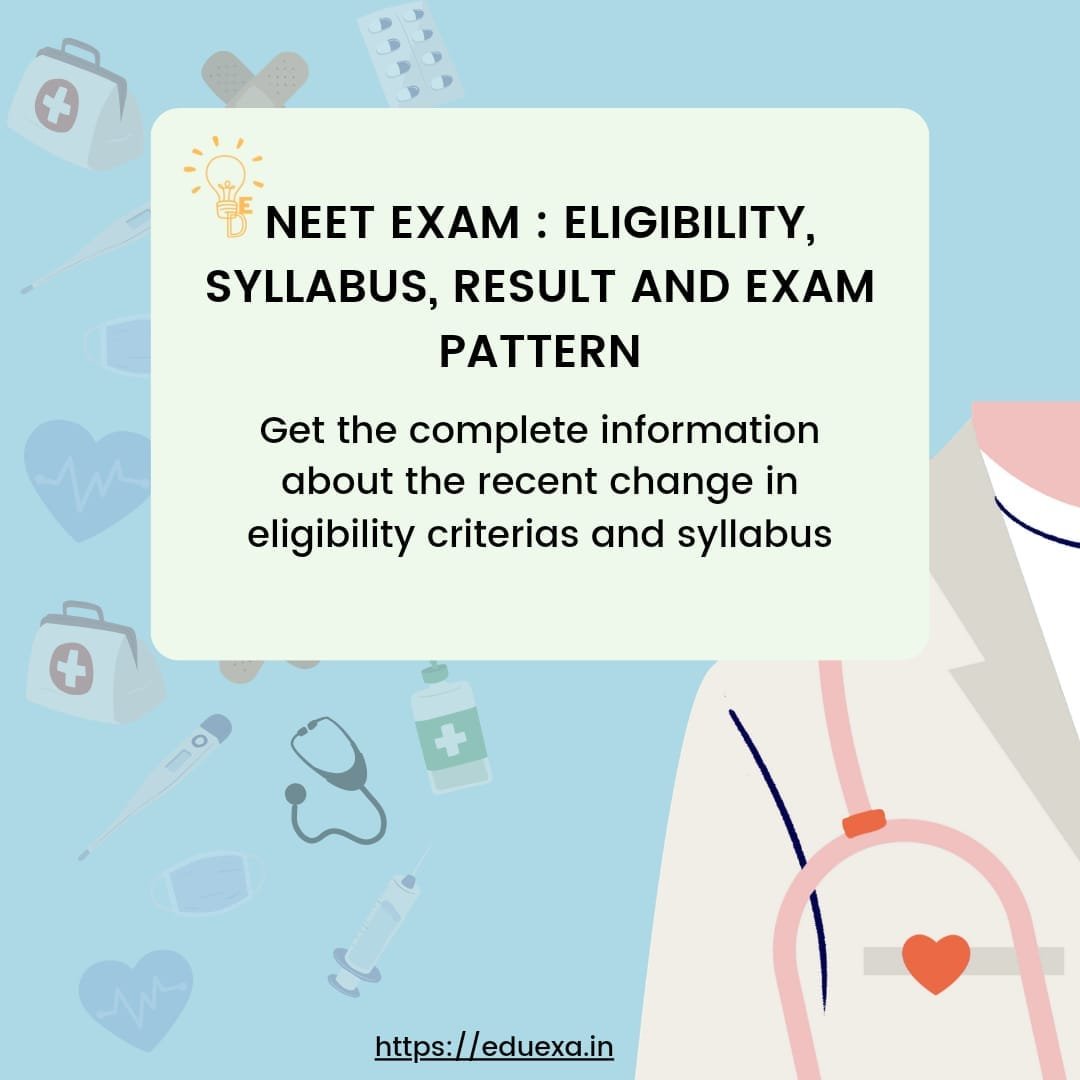Latest Update for NEET 2024
The NEET 2024 exam date is May 5, 2024. The NEET 2024 exam city intimation slip will be released tentatively in the mid of April 2024. The NEET admit card 2024 is expected to be released in the first week of May 2024, or few days before the exam date.
As per reports, the total number of NEET 2024 applications received this year has exceeded 23.84 lakh, which is the highest number so far. Uttar Pradesh received the highest number of applicants followed by Maharashtra and Rajasthan. Delhi is the city of highest exam centre preference. The number of male and female candidates has also increased substantially.
NTA has reversed the tie-breaking criteria to last year’s factors. In the revised criteria, the final factor was a computerised draw of lots, which replaced the subject-wise accuracy proportion of candidates, that was followed in the previous years.
What is NEET 2024 Exam?
The National Eligibility Entrance Test (NEET), formerly the All India Pre-Medical Test (AIPMT), is the entrance exam for Indian medical and dental institutes’ MBBS and BDS programmes. The National Testing Agency is in charge of carrying out the tests (NTA).
The test was previously administered by the Central Board of Secondary Education, which is an independent, autonomous, and self-sustaining top testing organisation (CBSE). The exam, which offers 90,000 seats in MBBS and BDS colleges in India, is held in May each year.
If you are a UR Category student then you have to face high cut off then others, Read complete guide here.
Candidates who want to study medicine must have taken Physics, Chemistry, and Biology/Biotechnology as compulsory topics in their 10th and 12th grades and must have passed them. At the time of the counselling round, the candidate must present their passing certificate. In the NEET-undergraduate exam, marks in mathematics are not taken into account (NEET-UG).
Objective
The NEET exam’s main goal is to speed up the admissions process for MBBS and BDS programmes. As a result, CBSE and the Medical Council of India introduced NEET full form test to replace many medical examinations across the country, including AIPMT (All India Pre-Medical Test, National Eligibility cum Entrance Test) (MCI). Previously, medical students in India had to fill out various applications for various medical entrance tests.
Get benefits from EWS Certificate, read here how to make the EWS Certificate, it will help you in NEET exam.
Until date, admission to SE seats has been based on national state level entrance exams. In India, there were around 25 separate medical entrance exams for admission to various government and private medical colleges.
On average, a student took 7-9 entrance tests, putting them and their parents under unneeded stress.
Moreover, taking so many exams places a significant financial burden on parents, since each exam entails expenses such as application fees and travel to take the entrance exam in different cities / at different test centres. As a result, NEET will save time, effort, and money by avoiding waste.
NTA also administers NEET post-graduation (NEET-PG), an eligibility-cum-ranking test prescribed as the single entrance examination for admission to several MD/MS and PG diploma degrees, in addition to undergraduate courses.
The NEET exam is available in English, Hindi, Marathi, Odia, Tamil, Marathi, Urdu Bengali, Telugu, Kannada, and Assamese and is administered online.
NTA announces the counselling process as soon as the NEET results are released. The Medical Counselling Committee (MCC) publishes the NEET counselling schedule on their website.
NEET Eligibility Criteria 2024
Candidates should read the application form carefully before applying for NEET to ensure that they meet the eligibility requirements. The exam criteria will differ depending on whether the exam is conducted in a state or throughout the country.
Age limit
All students must be at least 17 years old as of December 31 of the year of admission, regardless of their category. As a result, candidates must have been born on or before December 31, 2005 to be eligible for the lower age restriction.
There is no upper age limit for those intending to take the NEET exam.
Minimum Aggregate marks:
- For General Category: 50% and Physically disabled: 45%
- For OBC/SC/ST- 40% and Physically disabled: 40%
Year of Passing:
- Candidates who are scheduled to take their board examinations in 2024 are eligible
- Candidates who have taken the Class 12 test and are taking the improvement exam are eligible
- Students who took the Class 12 exam in 2021 and an improvement exam in 2024 are eligible to mention the year of the exam with a higher score.
NEET Eligibility Criteria for State Quota
It should be noted that around 85% of MBBS/BDS seats would be reserved for NEET states quota counselling. The remaining 15% of seats will be distributed at the national level for All India Counselling. As a result, candidates must meet the following requirements:
- Applicants must be citizens of the state in which they are applying.
- Applicants must be able to show proof of residency.
- Applicants must have completed (or be in the process of completing) their secondary education (Class 12th) in the relevant state.
Eligibility Criteria for All India Quota in NEET
- Applicants must be Indian citizens.
- The aforementioned age criteria must be met.
- Students from the UT of Ladakh will be eligible for admission under the 15% All India Quota seats starting in the academic year 2024-25.
NEET Exam Pattern 2024
- Exam Mode: Offline mode (Pen and Paper based)
(Candidates are given an OMR sheet to fill out with a black or blue ballpoint pen to mark their answers)
- Duration of Exam: The Exam duration is 200 minutes (3 hours 20 minutes)
- Time: 2:00 PM to 5:00 PM
- Question type: Objective type questions
- Medium/ Language: The question paper is asked in 13 languages English, Hindi, Assamese, Bengali, Gujarati, Malayalam, Kannada, Marathi, Odia, Tamil, Telugu, Urdu and Punjabi
- Total marks: 720 marks
- Subjects: Physics, Chemistry, and Biology (Botany & Zoology)
- Marking scheme:
- Each correct answer gets marks.
- For each incorrect answer, one mark will be deducted.
- No marks for unanswered questions.
NEET 2024 Exam- Section and Total marks
| Subjects | Sections | No. of questions | Marks per section |
| Physics | Section A | 35 | 140 |
| Section B | 15 | 40 | |
| Chemistry | Section A | 35 | 140 |
| Section B | 15 | 40 | |
| Botany | Section A | 35 | 140 |
| Section B | 15 | 40 | |
| Zoology | Section A | 35 | 140 |
| Section B | 15 | 40 | |
| Total Marks | 720 | ||
NEET 2024 Syllabus
NEET is regarded as one of the most difficult competitive exams due to its extensive syllabus and high competitive levels. Before beginning your NEET preparations, students should familiarise themselves with and comprehend each topic covered in the syllabus. The purpose of the NEET Syllabus is to help NEET hopefuls understand the subject that will be covered. For NEET to be cracked, a failsafe method must be designed and executed. The NEET curriculum provides a fair understanding of mark distribution as well as crucial topics to be prioritised.
NEET Physics Syllabus
The Physics section of the NEET is usually the most challenging for students because the questions require computations and the application of theoretical knowledge to solve questions. According to the NTA, the table below summarises all of the chapters from classes 11 and 12 that are covered in the NEET syllabus.
| Class 11th Syllabus | Class 12th Syllabus |
| Physical world and measurement | Electro statistics |
| Kinematics | Current Electricity |
| Laws of Motion | Magnetic effects of Current and Magnetism |
| Work, Energy, and Power | Electromagnetic induction and alternating currents |
| Motion of systems of particles and rigid body | Electromagnetic waves |
| Gravitation | Optics |
| Properties of Bulk Matter | Dual Nature of Matter and Radiation |
| Thermodynamics | Atoms and Nuclei |
| Behavior of Perfect Gas and Kinetic theory | Electronic Devices |
| Oscillations and wave |
NEET Chemistry Syllabus
The Chemistry component of NEET is considered the scoring section, with the majority of questions being NCERT-based and straightforward. In general, the chemistry questions on the NEET are simple to comprehend and answer. The NEET Chemistry syllabus for class 11 and class 12 is listed below.
| Class 11th Syllabus | Class 12th Syllabus |
| Some basic concepts of Chemistry | Solid state |
| Structure of atom | Solutions |
| Classification of Elements and Periodicity in Properties | Electrochemistry |
| Chemical Bonding and Molecular structure | Chemical Kinetics |
| States of Matter: Gases and liquids | Surface Chemistry |
| Thermodynamics | General principles and Processes of Isolation of Elements |
| Equilibrium | P Block elements |
| Redox reactions | D and F block elements |
| Hydrogen | Coordination compounds |
| s-Block elements (Alkali and Alkaline earth metals) | Haloalkanes and Haloarenes |
| Some p-Block elements | Alcohols, Phenols, and Ethers |
| Organic Chemistry – Some basic principles and techniques | Aldehydes, Ketones and Carboxylic Acids |
| Hydrocarbons | Organic compounds containing Nitrogen |
| Environmental chemistry | Biomolecules, Polymers, and Chemistry in everyday life |
NEET Biology Syllabus
There are 90 questions in the Biology section of the NEET, which is a lot because it covers a lot of Botany and Zoology, so there are a lot of things to study for. Because there are so many chapters in the Biology syllabus for NEET, it is highly suggested that you follow the NTA-recommended syllabus in the table below when studying for the exam.
| Class 11th Syllabus | Class 12th Syllabus |
| Diversity in the Living World | Reproduction |
| Structural organisation – Plants and Animals | Genetics and Evolution |
| Cell Structure and Function | Biology and Human welfare |
| Plant Physiology | Biotechnology and its applications |
| Human physiology | Ecology and environment |
Advantages of NEET 2024 Syllabus
The NEET syllabus is essential for a successful exam performance. Students frequently overlook essential topics covered in the curriculum because they fail to consult the NTA’s NEET syllabus, and hence are unable to respond to such questions if they come in the examination.
Candidates can interlink topics and study with a complete syllabus in hand, which is a fantastic technique for sound preparation as well as concept clarity. It only aids in the development of concepts that are critical for NEETs. Experts with years of expertise, as well as past NEET toppers, emphasise the relevance of the syllabus and attribute their success to a thorough comprehension of it.
NEET 2024 Registration
The NEET 2024 application is completed online in three simple stages —
- Online registration application
- Completing the online application
- Payment of the exam fee
Registration
- The first step is to register.
- Visit the official website of the NEET at https://neet.nta.nic.in/.
- On the homepage, there is a link to register for NEET. Click on it.
- Select New Registration from the drop-down menu.
- After carefully reading the instructions, eligibility criteria, and information bulletin, check the box “I agree” to accept the undertaking’s Terms & Conditions and then click the submit button.
- Fill out the online application form and keep track of the application number generated by the system.
- Create a password and select a security question to which you must respond.
- After inputting personal information, an application number is generated; use it to complete the following steps of the application process. For future references, the application number will be utilised.
Filling out the application form
To finish filling out the NEET application form, log in with the application number and password generated by the system. The candidate can next fill out the application form and submit it by providing personal information such as the applicant’s name, father’s name, mother’s name, date of birth, valid email address, and mobile number. They must type the information in capital letters as it appears on the Secondary School Examination or comparable Board/University Certificate.
After the candidate’s personal information has been verified, he or she can submit his or her address and academic information. The following information must be filled out by the candidate:
- Personal information (Nationality, Gender, Category, Aadhaar number)
- Information about your birthplace (Address, State, District)
- Attempts from the previous year (if any)
- Contact details
- Domicile of Candidate
- Information about candidate’s parents
- Academic details
Choose the medium of the question paper, the location of the exam, and the specifics of your academic qualifications before uploading papers and photographs. Scanned photos of the candidate’s recent passport size photo, postcard size photo, signature, and right and left thumb impressions should be uploaded. Provide the following documents, if applicable: citizenship certificate, category certificate, and PwD certificate.
Fees payment
- Once steps 1 and 2 have been completed, candidates must pay the examination fee.
- Payments can be made via a debit/credit card, net banking, UPI, or Paytm account. Processing charges and GST are in addition to the examination fee.
- The confirmation page of the application form will be generated after successful payment.
- For future reference, download and save a copy of the confirmation page
A valid phone number and email address, as well as a postal address with a PIN code, must be provided by the applicant. Finally, a registration number will be generated after the application form has been submitted. This registration number should be written down for future reference and use.
Frequently Asked Questions(FAQs)
1. What classes are included in the NEET exam’s syllabus?
Ans: In order to ensure uniformity in medical education across India, the MCI has analysed the syllabus specified by different State boards, as well as the syllabus prescribed by NCERT, CBSE, and COBSE in class 11 and 12 physics, chemistry, and biology.
2. Is NEET exam MCQ based?
Ans: NTA will conduct the exam in a pen and paper-based format in accordance with the latest NEET exam pattern. Multiple Choice Questions (MCQs) will be included in the NEET 2024 exam, which has a three-hour time limit for candidates to answer questions from the given NEET syllabus in physics, chemistry, and biology.
3. What is considered a good NEET score?
Ans: According to last year’s cutoff marks, a good NEET score for MBBS admissions can range from 720 – 147. What is considered a good NEET score? Students must score at least 670 – 690 marks in order to be included in the top 100 NEET 2020 AIQ list of the best students.
4. Is the NEET exam the same in every set?
Ans: NEET’s codes can be found on various pieces of paper. The questions on each test, regardless of code, are identical. In order to prevent cheating and other forms of malpractice, the questions on each code’s paper are arranged in a different order.
5. What is the eligibility age for NEET 2024?
Ans: On December 31, 2024, candidates must be at least 17 years old. The age restriction for the NEET medical entrance exam has been lifted, allowing anyone to apply. The maximum number of NEET attempts in 2024 is unrestricted.



